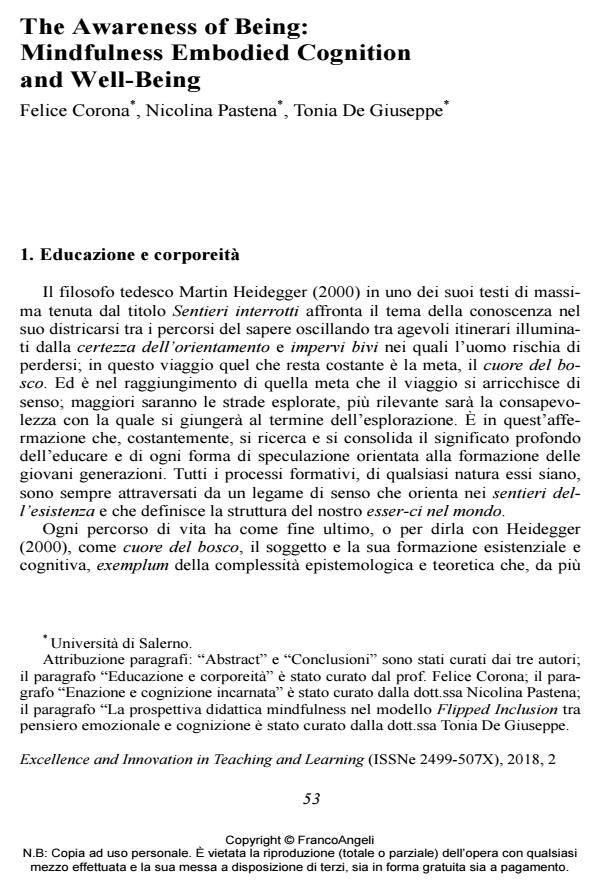The Awareness of Being: Mindfulness Embodied Cognition and Well-Being
Titolo Rivista EXCELLENCE AND INNOVATION IN LEARNING AND TEACHING
Autori/Curatori Felice Corona, Nicolina Pastena, Tonia De Giuseppe
Anno di pubblicazione 2018 Fascicolo 2018/2
Lingua Inglese Numero pagine 20 P. 53-72 Dimensione file 213 KB
DOI 10.3280/EXI2018-002004
Il DOI è il codice a barre della proprietà intellettuale: per saperne di più
clicca qui
Qui sotto puoi vedere in anteprima la prima pagina di questo articolo.
Se questo articolo ti interessa, lo puoi acquistare (e scaricare in formato pdf) seguendo le facili indicazioni per acquistare il download credit. Acquista Download Credits per scaricare questo Articolo in formato PDF

FrancoAngeli è membro della Publishers International Linking Association, Inc (PILA), associazione indipendente e non profit per facilitare (attraverso i servizi tecnologici implementati da CrossRef.org) l’accesso degli studiosi ai contenuti digitali nelle pubblicazioni professionali e scientifiche.
Formative processes are always crossed by a link of meaning that orients us in the paths of existence and defines the structure of our being in the world. The contrast between the emotional/affective aspect and the rational/cognitive aspect represent the main source of tension (Dewey, 1968) that characterizes human suffering. The recent neuro-scientific acquisitions and the neuropedagogical field of investigation enriched by many speculative ideas (Minichiello & Pastena, 2015), favor the idea of a circular relationship between perception and action. The complexity of the educational event is characterized by a constant communicative-interpretative movement between the educating and the educator, where signatures of various kinds come into play. mindfulness (Siegel, 2011), as the subject’s ability to cultivate the wealth of experience (Siegel, 2015), could respond to the "social need" (Beck, 2000) of emotional management, with drive control (Gordon, 2014) to avoid drifting from conflict, which places the educational in a prominent formative position (Corona, De Giuseppe, 2016, p. 101).
Parole chiave:Consciousness, emotions, corporeity, education, flipped inclusion, mindfulness.
Felice Corona, Nicolina Pastena, Tonia De Giuseppe, The Awareness of Being: Mindfulness Embodied Cognition and Well-Being in "EXCELLENCE AND INNOVATION IN LEARNING AND TEACHING" 2/2018, pp 53-72, DOI: 10.3280/EXI2018-002004